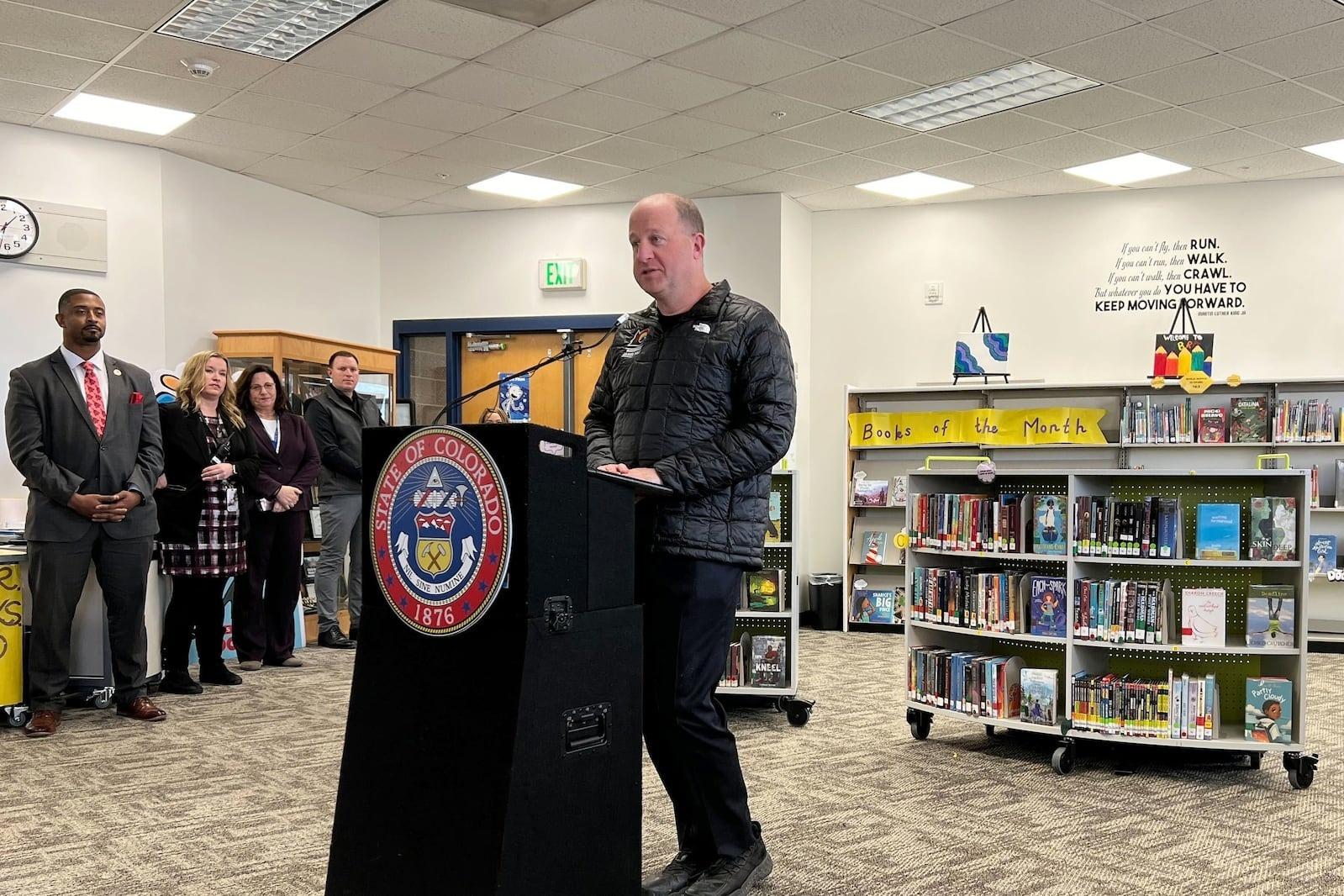
Editor's Note: This story contains mentions of suicide and descriptions of violence.
A man in Denver paints a message on his car: “I’m going to kill them.”
A veteran in El Paso County says inexplicable, emotional goodbyes to his children. An increasingly paranoid retiree stockpiles rifles and guns at his townhome in Denver.
“I’m always homicidal,” a former Marine tells a cop.
A woman reads a text message from her former spouse: “This is all because of you.”
These details and allegations are drawn from just a few of the court cases filed under Colorado’s Extreme Risk Protection Order law, which is meant to take guns away from people who are a danger to themselves or others.
From its implementation in 2020 through mid-November 2022, police officers and ordinary people used the law 359 times to ask courts to impose so-called “red flag” orders, which temporarily ban someone from buying and possessing guns. In all, 168 people were required to relinquish their firearms for a year or longer.
In recent months, CPR News has reviewed records for each of those cases. Together, they show how the controversial new law is being used in Colorado.
The analysis reveals cases where the law may have prevented murders and mass shootings. But it also shows striking differences in how different police agencies and courts are defining “extreme risk” — as well as frustrations and difficulties for people on both sides of the law.
Suicide, threats and mass shootings: Why ERPO cases are filed
When they are taken together, Colorado’s “red flag” cases paint a disturbing picture of the countless moments that may precede acts of violence — from desperate people in the grips of suicidal ideations to would-be murderers with plans for revenge.
In roughly half of the ERPO cases, about 180 in total, the respondent was accused of threatening others, either explicitly or indirectly.
But at times, the people pursuing orders were more worried about someone’s irresponsible use of firearms, rather than any apparent intent to kill. Several people had fired guns into the walls of their homes while in the grip of paranoid delusions, court files stated.
| If you or someone you know is in crisis or looking for mental health services, call the Colorado Crisis Services hotline at 1-844-493-8255, or text “TALK” to 38255. |
A smaller number of respondents — about a third of all cases — were reportedly considering death by suicide. The lower prevalence of suicidal people is “surprising,” said Chris Knoepke, assistant professor at the University of Colorado School of Medicine.
“We know risk of self-harm, risk of suicide, is more prevalent in general than very high-level threats to other people,” Knoepke said. The smaller number of suicide cases may show that people don’t know they can get help from the law when a loved one is struggling with suicidal ideations, he said.
“Moving firearms out of the house, and making them inaccessible to the person at risk is one of the most effective ways of preventing suicide death and injuries from self-inflicted violence,” he said.
There also were at least eleven people who reportedly discussed a “suicide by cop,” in which they intended to force a police officer to kill them. Often, people threatened to harm both themselves and others.
In about 30 cases, the person allegedly talked about carrying out a mass shooting or other public attack, with various degrees of planning completed. At least half of those people were reported to have guns. In other cases, police simply wanted to stop the respondent from acquiring weapons.
Among those cases where a judge agreed to issue an ERPO were:
- A sheriff’s deputy who allegedly planned to lie in wait and kill his lieutenant
- Several people who talked about attacking grocery stores
- A man who threatened to kill the state’s attorney general
- A man outside Boulder who threatened to “annihilate” government employees if they came on his property
- A man with access to dozens of guns who planned to “shoot it out with the cops” and “didn’t care that the cops would not see their kids again.”
In about 100 of the roughly 360 cases filed, court records do not document an explicit threat of violence or misuse of a firearm. Many of these cases were filed by individual petitioners, rather than police, and they often were dismissed by judges.
Who is being 'red flagged?'
The typical subject of an ERPO petition was a 37-year-old man. In fact, nearly 90 percent of petitions were filed against men.
Black people were somewhat disproportionately the subjects of petitions, making up about 9 percent of respondents whose race could be determined from court documents, compared to 6 percent of the state’s population. Those figures are influenced by heavier usage of ERPO in Denver, where Black people make up about 10 percent of the population and about 18 percent of ERPO cases.
It was not possible to analyze the usage of ERPO against Latinos, because police are inconsistent in how they record data about Hispanic ethnicity.
In all, 359 cases were initiated against about 335 different people. The respondents were suspected of possessing, in total, about 800 guns, according to court filings — but there was a wide range.
One respondent had more than 60 firearms and had made alarming comments about hiding bodies, according to a family member’s testimony.
In another case, detectives with Douglas County and Jefferson County sheriff’s offices seized 59 firearms and 50,000 rounds of ammunition from a man’s home and storage unit. The man had also been arrested for impersonating a sheriff’s deputy.
Where police are — and aren’t — using the law
“Red flag” petitions can be filed by two different groups of people. They can be initiated by someone with a close relationship to the subject, such as a family member, romantic partner or housemate.
But they also can be filed by law enforcement officers. And the data shows that most Colorado law agencies are using the law rarely.
In most counties, police have filed a handful of red flag petitions at most. In 40 of Colorado’s 64 counties, they had filed none at all, the analysis found.
However, one agency stands out in the numbers: The Denver Police Department had filed about 90 red flag cases during the study period. That’s more than half of all the cases filed by law enforcement in the state.
“It's our responsibility to protect our community. And this is part of protecting our community,” said Division Chief Joe Montoya, who oversees a team of investigators dedicated largely to ERPO.
Shannon Frattaroli, a professor at the Johns Hopkins Center for Gun Violence Solutions, said that red flag laws are designed to leave decision-making with local authorities. Often, the rate of usage depends on the enthusiasm of local law enforcement leaders.
“You can usually trace that back to what I’ll call an ERPO implementation champion … somebody who just sees this law as a real opportunity to increase community safety,” she told CPR News in November. Colorado’s law, she said, had faced unusual resistance from some in law enforcement.
| Do you want to share your experience with Colorado’s ERPO law? Email the reporter, Andy Kenney, at [email protected] and let us know if you would like to remain anonymous. |
In El Paso County, law enforcement had filed only two petitions under the law, despite having a population similar to Denver’s. El Paso is one of a number of conservative counties that vowed to oppose the ERPO law as it was approved in 2019, declaring themselves “Second Amendment sanctuaries” or “preservation” counties. Leaders there saw the law as an unjust intrusion on gun rights.
Agencies’ reluctance to use ERPO has come under scrutiny since the Club Q shooting. The former sheriff has defended the decision not to seek an order against the accused shooter, who had been arrested a year earlier after a standoff with police.
The sheriff’s office said a red-flag order would have been redundant, since the authorities confiscated and kept the suspect’s guns during the earlier criminal case. However, an order also would have barred the suspect from buying new guns.
Spokespeople for the Colorado Springs Police Department and El Paso County Sheriff’s Office did not respond to requests for interviews.
The result: Vastly different outcomes in different counties
“Red flags” have been used much less often in Colorado than in several other states.
In all, judges ordered 168 different people to relinquish their guns for a year or longer. That amounts to about 3.7 orders for every 100,000 adults, CPR News found.
An AP investigation found much higher rates of usage in some other states with similar laws. For comparison, Florida leads the nation in red flag orders — issuing ten times more, accounting for population, than Colorado had over a recent period.
The slower rate of adoption has happened, in part, because of many Colorado police departments’ infrequent use of the law. It may also show a general lack of education and understanding of the law, experts and advocates said.
But even within Colorado, people seeking a red flag may have a dramatically different experience in different regions — or even between neighboring cities.
With its strong police involvement, Denver is far ahead of any other county in ERPO usage. Denver’s courts issued about 90 ERPO orders in the study period, almost all of them coming from police cases. That far outpaces other large counties, even adjusting for population.
Many individuals take the process into their own hands
In the 187 cases filed by individuals, the petitions show family members and others struggling to deal with their loved one’s mental health issues and more. There were scores of references to alcoholism, drug use and abuse — often stretching over a period of years.
“Often, my words can lessen his darkness, but this time he was spiraling downward quickly and was becoming irrational,” one woman wrote of her husband.
In some cases, the requester also was pursuing other options, such as a mental health commitment, or domestic violence criminal charges — both of which could also result, eventually, in a person losing their gun rights.
Those citizen petitions made up more than half of all cases statewide. But they were far more common in places like El Paso County, suggesting that when law enforcement takes a less active role in the ERPO process, private citizens may be more likely to file the petitions themselves.
While individuals always have the power to start the process, ERPO cases can be frustrating without police support, several petitioners told CPR News.
“lt was so challenging to get anyone to listen, to even just listen,” said one woman who filed a petition against a former spouse in Jefferson County, in an interview. “We have these rights, but then in certain situations, even if you know the system, it feels almost impossible to get that justice.”
CPR News is withholding the woman’s name at her request due to safety and privacy concerns.
Police are far more likely to succeed than citizens
There’s an overwhelming trend in the data: Petitions filed by law enforcement are far more likely to be granted, compared to requests from private citizens.
Across Colorado, about 80 percent of requests from law enforcement resulted in a year-long ‘red flag’ order. In comparison, only about 17 percent of those filed by individuals had that outcome.
That’s not surprising. Police have access to city attorneys and other resources to help them make strong arguments.
In contrast, court documents show that many private filers go through the process without any formal legal assistance. Often, individuals may fill out a form incorrectly, or they may not provide the details that the certain judge wants to see.
Some individual cases also appear to have been frivolous or malicious. Private citizens have occasionally filed petitions against family members, public figures and even government offices without stating any legal reason a person’s guns should be taken. Weld County Sheriff Steve Reams has faced three “red flag” petitions, all unsuccessful.
In those cases, the courts have generally rejected the request with a form letter.
Meanwhile, the subjects of ERPOs are guaranteed the right to counsel, and there are a growing number of lawyers who specialize in helping targets of ERPOs defend their right to possess firearms.
There also is evidence that various judges and courts may handle the law differently. Individuals in El Paso County had some of the lowest success rates in the state, with just under 10 percent of their petitions resulting in a full ERPO order. In comparison, individuals in Denver got the yearlong ERPOs about 17 percent of the time.
The number of cases is so small that it’s hard to draw definitive conclusions — but the judges themselves also have expressed a wide range of opinions about how the law should be handled.
For example, several have rejected petitions because the person didn’t already own a firearm, or didn’t have an immediate plan to buy one.
In one case involving an apparently suicidal man in Arapahoe County, the judge refused to issue an order because the man “didn’t currently have a gun” and had no plan to get one. But the man had reportedly told his wife that he wished he “had never gotten rid of” his guns, adding: “If I still had my guns today, I would have killed myself.”
The family could not be reached for comment.
Knoepke, with CU’s School of Medicine, said judges have wide latitude to grant or deny a request. The law asks judges to evaluate whether a “clear and convincing” evidence shows someone is a risk to themselves or others. It suggests some factors that should be considered, but sets few strict requirements.
“All of these standards are all over the map, and there's no checklist,” Knoepke said. He thinks the law needs that flexibility, but said petitioners may often struggle to understand a judge’s decisions.
In most cases, the judges left little written explanation of their decisions, though they may have given a verbal explanation in court.
Uptake remains slow
Usage of the ERPO law has remained slow and steady since it was introduced.
On average, private citizens have filed about four ERPO requests per month over the law’s first few years. Law enforcement have filed at the same rate, with little sign of an upward trend.
The only month in which the authorities filed more than ten requests was April 2021 — in the weeks following the murder of 10 people at a King Soopers in Boulder. While there’s no direct evidence of a connection, the supermarket attack had similarly raised questions about whether the accused gunman could have been identified and stopped earlier.
Still, the law is relatively new in Colorado, and many backers believe it will eventually be more widely adopted. Tony Spurlock, the former sheriff of Douglas County, was a champion of the legislation.
“Take the cases that we have here in Douglas County. Those individuals were at extreme risk, crisis at the time,” he said. “We removed their weapons, and then we also assisted them in seeking treatment. I can emphatically say, ‘That works.’ Those four people (who were served with orders) are still alive today.”
But the state has still experienced numerous mass shootings since the law went into effect, leading the ERPO law’s critics to question its effectiveness — and its proponents to ask what more can be done.
This article is the first in a CPR News series on the red flag law, based on the analysis of nearly 400 cases, along with interviews with dozens of experts and others involved in these cases.
Together, the series will address the sharp differences in how different law enforcement agencies are using extreme risk orders; the reasons that so many ERPO cases are dismissed; the experiences of people on both sides of the law, including concerns about its broad reach; and the changes that people involved with the law still want to make.
Journalist Will Cornelius, a former CPR News intern, contributed to this series.
Editor's Note: This article was updated to correct figures in the table of cases filed by individuals filers, the Larimer County Sheriff's Office and the Woodland Park Police Department.
Explore our 'red flag' series
- How Colorado lawmakers want to change the ‘red flag’ gun law — or not
- What one ‘red flag’ case in Denver says about how the city removes guns
- Are mass shootings being stopped by Colorado’s ‘red flag’ law?
- ‘They’re not gonna help you’: Why domestic violence survivors say they’re being failed by police and the ‘red flag’ law









